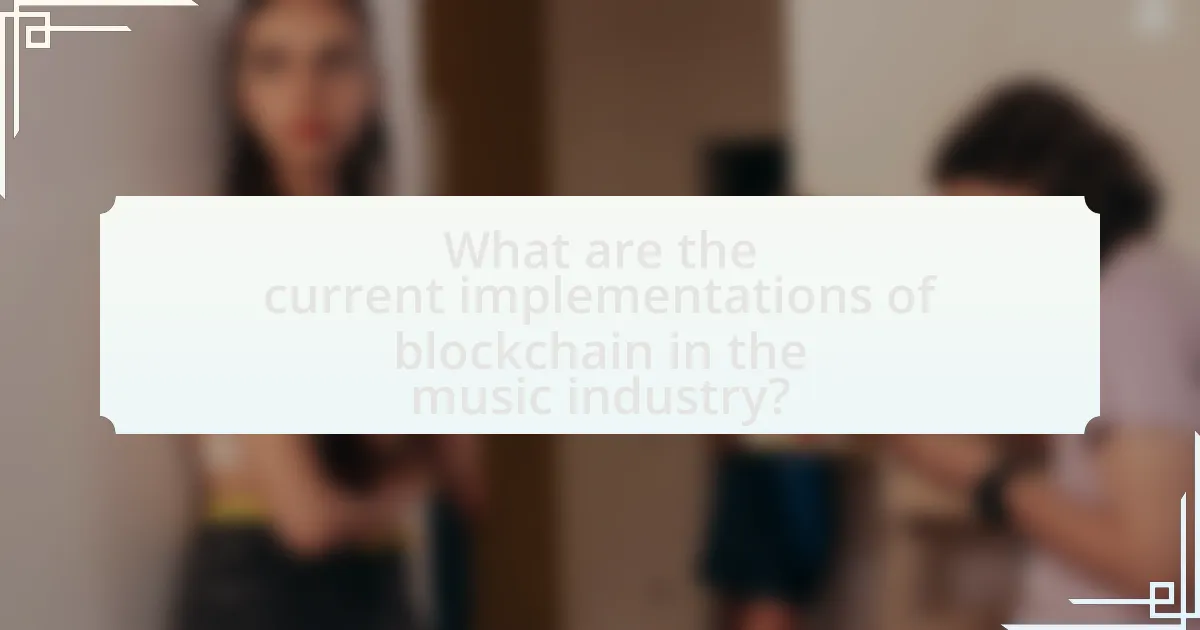Blockchain technology is revolutionizing music rights management by offering a decentralized and transparent system for tracking ownership and usage rights. This innovation allows artists and rights holders to register their works on a blockchain, ensuring immutable records of transactions and facilitating direct payments through smart contracts. The article explores the challenges of traditional music rights management, such as complex ownership structures and inefficient royalty distribution, and highlights how blockchain addresses these issues by enhancing transparency, reducing disputes, and increasing revenue for artists. Additionally, it discusses current implementations and future developments in the industry, emphasizing the potential for blockchain to empower creators and streamline rights management processes.

How is Blockchain Transforming Music Rights Management?
Blockchain is transforming music rights management by providing a decentralized and transparent system for tracking ownership and usage rights. This technology enables artists and rights holders to register their works on a blockchain, ensuring that all transactions related to their music are recorded immutably. For instance, platforms like Audius and Ujo Music utilize blockchain to facilitate direct payments to artists, eliminating intermediaries and ensuring that creators receive a fair share of revenue. Additionally, smart contracts automate royalty distribution based on predefined conditions, enhancing efficiency and reducing disputes over payments. The integration of blockchain in music rights management not only increases transparency but also empowers artists by giving them greater control over their intellectual property.
What are the key challenges in traditional music rights management?
The key challenges in traditional music rights management include complex ownership structures, lack of transparency, and inefficient royalty distribution systems. Complex ownership structures arise from multiple stakeholders, such as songwriters, producers, and record labels, making it difficult to determine who holds the rights to a piece of music. Lack of transparency is prevalent due to the opaque nature of agreements and contracts, which can lead to disputes and confusion over rights ownership. Inefficient royalty distribution systems result in delays and inaccuracies in payments to artists, as traditional methods often involve multiple intermediaries, leading to a significant portion of royalties being lost or misallocated. These challenges hinder fair compensation for artists and complicate the overall management of music rights.
How do these challenges affect artists and creators?
Challenges in music rights management significantly impact artists and creators by limiting their ability to receive fair compensation for their work. These challenges include issues such as copyright infringement, lack of transparency in royalty distribution, and the complexity of navigating multiple rights holders. For instance, a study by the International Federation of the Phonographic Industry (IFPI) in 2021 revealed that only 12% of artists felt they were fairly compensated for their music, highlighting the financial strain caused by these systemic issues. Consequently, artists often struggle to sustain their careers, leading to decreased creativity and innovation in the industry.
What are the limitations of current rights management systems?
Current rights management systems face several limitations, including lack of transparency, inefficiency in tracking rights ownership, and difficulties in managing complex rights structures. These systems often rely on centralized databases, which can lead to data discrepancies and hinder real-time updates. For instance, a study by the International Federation of the Phonographic Industry (IFPI) in 2020 highlighted that 70% of music creators struggle to receive fair compensation due to these inefficiencies. Additionally, the inability to easily transfer rights across different platforms complicates the monetization process for artists. These limitations underscore the need for more innovative solutions, such as blockchain technology, which can enhance transparency and streamline rights management.
How does blockchain technology address these challenges?
Blockchain technology addresses challenges in music rights management by providing a decentralized and transparent system for tracking ownership and usage rights. This technology enables artists and rights holders to register their works on a public ledger, ensuring that all transactions are recorded immutably. For instance, smart contracts can automate royalty payments, ensuring that artists receive compensation directly and promptly when their music is used, thus reducing the need for intermediaries. According to a report by the World Economic Forum, blockchain can streamline the distribution of royalties, potentially increasing the efficiency of payments by up to 80%. This transparency and efficiency help mitigate issues of fraud and mismanagement in the music industry.
What features of blockchain make it suitable for music rights management?
Blockchain’s decentralized nature, transparency, and immutability make it highly suitable for music rights management. The decentralized structure allows for direct peer-to-peer transactions, eliminating intermediaries and reducing costs. Transparency ensures that all transactions are visible to all parties involved, which fosters trust among artists, producers, and consumers. Immutability guarantees that once a record is added to the blockchain, it cannot be altered or deleted, providing a permanent and verifiable history of ownership and rights. These features collectively enhance the efficiency and accuracy of rights management in the music industry, addressing issues such as copyright infringement and royalty distribution.
How does decentralization impact rights ownership?
Decentralization significantly enhances rights ownership by distributing control among multiple stakeholders rather than centralizing it in a single entity. This shift allows artists and creators to retain greater ownership of their work, as blockchain technology enables direct transactions and transparent tracking of rights without intermediaries. For instance, through smart contracts on blockchain platforms, artists can automatically receive royalties whenever their music is played, ensuring they are compensated fairly and promptly. This model contrasts with traditional systems where record labels and distributors often take a substantial share of earnings, leading to reduced income for creators. The implementation of decentralized systems in music rights management thus empowers artists, fosters transparency, and promotes equitable distribution of revenue.

What are the benefits of using blockchain in music rights management?
The benefits of using blockchain in music rights management include enhanced transparency, improved efficiency, and increased revenue for artists. Blockchain technology allows for a decentralized ledger that records all transactions related to music rights, ensuring that all parties have access to the same information, which reduces disputes and enhances trust. Additionally, smart contracts automate royalty payments, streamlining the process and reducing administrative costs. According to a report by the World Economic Forum, blockchain can potentially increase revenue for artists by up to 30% by ensuring that they receive fair compensation for their work without intermediaries taking a significant cut.
How does blockchain enhance transparency in music rights?
Blockchain enhances transparency in music rights by providing a decentralized and immutable ledger that records ownership and transaction history. This technology allows all stakeholders, including artists, producers, and consumers, to access real-time data regarding rights ownership and usage, thereby reducing disputes and ensuring fair compensation. For instance, platforms like Audius utilize blockchain to enable artists to directly manage their rights and royalties, ensuring that all transactions are transparent and verifiable. This transparency is further supported by the fact that once data is recorded on the blockchain, it cannot be altered, which helps maintain trust among all parties involved in the music ecosystem.
What role does smart contracts play in rights management?
Smart contracts play a crucial role in rights management by automating the execution of agreements related to intellectual property. They enable transparent, tamper-proof transactions that ensure creators receive fair compensation for their work. For instance, smart contracts can automatically distribute royalties to artists and rights holders based on predefined conditions, eliminating the need for intermediaries and reducing administrative costs. This efficiency is supported by blockchain technology, which provides a secure and immutable ledger for tracking ownership and usage rights, thereby enhancing trust among stakeholders in the music industry.
How can blockchain reduce disputes over music rights?
Blockchain can reduce disputes over music rights by providing a transparent and immutable ledger for tracking ownership and usage rights. This technology allows artists, producers, and other stakeholders to register their rights in a decentralized manner, ensuring that all parties have access to the same information regarding ownership and royalties. For instance, smart contracts can automate royalty payments based on predefined conditions, minimizing the chances of misinterpretation or error. According to a report by the World Economic Forum, blockchain can enhance trust and reduce conflicts by ensuring that all transactions are recorded and verifiable, thus fostering a more equitable distribution of revenue in the music industry.
What economic advantages does blockchain provide to artists?
Blockchain provides artists with economic advantages such as increased revenue through direct sales and reduced transaction costs. By utilizing smart contracts, artists can receive payments instantly and retain a larger share of their earnings, as intermediaries like record labels and distributors are minimized. For instance, a study by the World Economic Forum highlights that blockchain can reduce transaction costs by up to 90%, allowing artists to benefit more from their work. Additionally, blockchain enables transparent tracking of royalties, ensuring that artists are compensated fairly for their contributions, which is crucial in an industry often plagued by disputes over rights and payments.
How does blockchain facilitate direct payments to artists?
Blockchain facilitates direct payments to artists by enabling peer-to-peer transactions without intermediaries. This technology allows artists to receive payments directly from consumers through smart contracts, which automatically execute transactions when predefined conditions are met. For instance, platforms like Audius utilize blockchain to ensure that artists are compensated immediately upon the sale or streaming of their music, eliminating delays associated with traditional payment systems. Additionally, the transparency of blockchain ensures that artists can track their earnings in real-time, providing a clear view of revenue generated from their work. This direct payment model not only increases artists’ revenue share but also enhances their control over their intellectual property.
What impact does blockchain have on revenue distribution?
Blockchain significantly enhances revenue distribution by enabling transparent, real-time tracking of transactions and rights ownership. This technology allows artists and creators to receive payments directly from consumers, eliminating intermediaries such as record labels and distributors. For instance, platforms like Audius utilize blockchain to ensure that artists receive a higher percentage of revenue, often reported to be up to 90%, compared to traditional models where they might receive only 10-20%. This shift not only increases the earnings for creators but also fosters a fairer distribution model, as all transactions are recorded on an immutable ledger, ensuring accountability and reducing disputes over revenue sharing.

What are the current implementations of blockchain in the music industry?
Current implementations of blockchain in the music industry include platforms like Audius, which allows artists to publish their music directly to fans while retaining ownership and control over their content. Additionally, companies like Ujo Music utilize blockchain to manage rights and royalties, ensuring transparent and fair compensation for artists. Provenance is another implementation, where blockchain tracks the ownership and distribution of music, providing a clear history of rights. These implementations enhance transparency, reduce piracy, and streamline royalty payments, addressing long-standing issues in music rights management.
Which companies are leading the way in blockchain music rights management?
Companies leading the way in blockchain music rights management include Audius, Ujo Music, and Myco. Audius is a decentralized music streaming platform that allows artists to publish their music directly to fans while retaining control over their rights and revenue. Ujo Music utilizes blockchain technology to enable artists to manage their rights and royalties transparently, ensuring they receive fair compensation. Myco focuses on providing a platform for artists to track their music rights and earnings through blockchain, enhancing transparency in the music industry. These companies exemplify how blockchain technology is transforming music rights management by increasing transparency and empowering artists.
What innovative projects are utilizing blockchain for music rights?
Innovative projects utilizing blockchain for music rights include Audius, Ujo Music, and Myco. Audius is a decentralized music streaming platform that allows artists to publish their music directly to fans while retaining control over their rights and earnings. Ujo Music enables artists to manage their rights and royalties through smart contracts, ensuring transparent and fair compensation. Myco focuses on providing a platform for artists to tokenize their music rights, allowing for fractional ownership and investment in music assets. These projects demonstrate how blockchain technology can enhance transparency, efficiency, and fairness in music rights management.
How successful have these implementations been so far?
The implementations of blockchain in music rights management have been moderately successful so far. Several platforms, such as Ujo Music and Myco, have demonstrated the ability to streamline royalty distribution and enhance transparency for artists. For instance, Ujo Music reported a 50% reduction in the time taken to process payments to artists compared to traditional methods. Additionally, the integration of smart contracts has allowed for automated royalty payments, which has been positively received by independent musicians seeking fair compensation. These examples illustrate the effectiveness of blockchain technology in addressing long-standing issues in the music industry.
What are the potential future developments in blockchain music rights management?
Potential future developments in blockchain music rights management include enhanced transparency, automated royalty distribution, and improved artist control over their intellectual property. Enhanced transparency will allow all stakeholders to track music usage in real-time, reducing disputes over rights and ensuring fair compensation. Automated royalty distribution through smart contracts can streamline payments, ensuring that artists receive their earnings promptly and accurately based on predefined conditions. Furthermore, improved artist control will empower musicians to manage their rights directly on blockchain platforms, eliminating intermediaries and allowing for more equitable revenue sharing. These developments are supported by ongoing advancements in blockchain technology and increasing adoption within the music industry, as evidenced by initiatives from companies like Audius and Ujo Music, which are already implementing these concepts.
How might blockchain evolve to further benefit artists?
Blockchain may evolve to further benefit artists by enhancing transparency and efficiency in royalty distribution. As blockchain technology matures, it can facilitate smart contracts that automatically execute payments to artists upon the sale or streaming of their music, ensuring they receive fair compensation without intermediaries. For instance, a study by the Berklee College of Music highlights that blockchain can reduce transaction costs and increase the speed of payments, allowing artists to receive their earnings in real-time. This evolution not only empowers artists financially but also fosters trust in the music industry by providing a clear, immutable record of ownership and rights management.
What challenges remain for widespread adoption of blockchain in music?
The challenges that remain for widespread adoption of blockchain in music include regulatory uncertainty, technological complexity, and the need for industry-wide collaboration. Regulatory uncertainty arises from the lack of clear legal frameworks governing blockchain technology and its applications in music, which can hinder investment and innovation. Technological complexity presents a barrier as many stakeholders, including artists and labels, may lack the technical expertise to implement blockchain solutions effectively. Additionally, the music industry is fragmented, making it difficult to achieve the necessary collaboration among various stakeholders, such as artists, record labels, and streaming platforms, to create a unified blockchain ecosystem. These challenges must be addressed to facilitate the broader acceptance and integration of blockchain in music rights management.
What practical steps can artists take to leverage blockchain for their music rights?
Artists can leverage blockchain for their music rights by registering their works on a blockchain platform that supports smart contracts. This registration allows artists to establish ownership and automate royalty payments through self-executing contracts, ensuring they receive fair compensation for their work. For instance, platforms like Audius and Ujo Music enable artists to upload their music and set terms for usage, which are then enforced by the blockchain. Additionally, artists can use non-fungible tokens (NFTs) to create unique digital assets representing their music, providing a new revenue stream and enhancing fan engagement. According to a report by Deloitte, blockchain technology can reduce transaction costs and increase transparency in the music industry, making it easier for artists to manage their rights effectively.

Leave a Reply